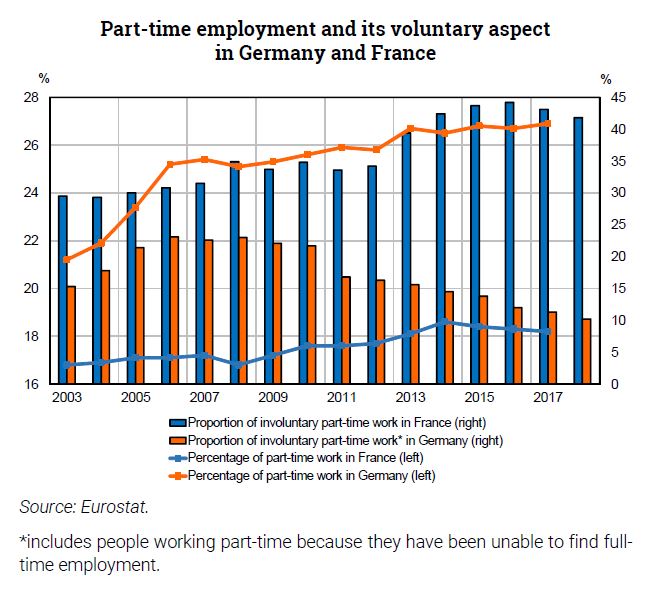Trésor-Economics No. 249 - Part-time employment and hiring difficulties in Germany
Germany is distinguished from France by a high participation rate and a particularly low unemployment rate, which is accompanied by strong tensions on the labour market. However, Germany is also characterised by a high share of part-time workers: mainly women who would like to work more but without moving to full-time work. The government is taking steps to remove some of the disincentives and facilitate the increase in the hourly volume of part-time jobs.
In contrast to France, Germany enjoys a high labour participation rate and a particularly low unemployment rate, 3.4% in 2018, the lowest since reunification. These have gone hand-in-hand with severe labour market tensions. However, Germany also has a high proportion of part-time workers, which raises the question as to whether these workers could provide a solution to the current hiring difficulties experienced by German companies.
Part-time employment in Germany rose sharply during the 2000s in connection with the Hartz reforms, which broadened the scope of so-called "marginal" jobs (mini- and midi-jobs – very part-time positions for which employee contributions are minimal) and made the conditions in which they could be used more flexible. Interestingly, part-time work is less often reported as an involuntary phenomenon in Germany than in France (see chart). Women, who are over-represented in this type of employment, say less often than in other countries that they would prefer to work full-time. This can be attributed to cultural differences and the specificities of Germany's tax and social security system, but also to constraints concerning childcare and school hours.
Although few women want to move to full-time work, many of those working part-time want to increase their hours (by 10 to 14 hours per week, depending on the survey). Moreover, they specialise in the service sector, where labour needs are concentrated and a desired increase in hours could satisfy a significant portion of the need.
The recent slowdown in the German economy starting in 2018 has led to a decline in labour market tensions, although they still remain high in comparison with recent years. Several recent measures should further reduce these tensions. The reform making employee contributions more progressive as of 1 July 2019 for a portion of the part-time workforce could encourage some to work longer hours. This reform is expected to affect nearly five million employees. Other efforts that should help lessen constraints on the German labour supply include an act to improve childcare services, which was adopted at the end of 2018, and the amendment, slated for 2020, of the rules governing how certain social benefits are granted. In addition, the introduction of a minimum wage and the wage increases it has entailed tend to limit the demand for low-skilled labour, but could boost labour supply.
